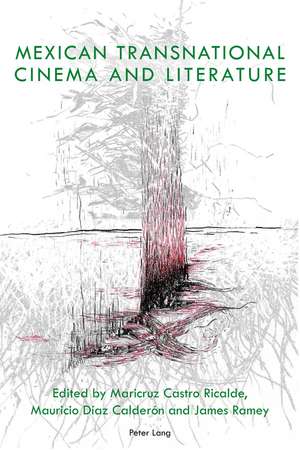Mexican Transnational Cinema and Literature: Transamerican Film and Literature
Editat de Castro Ricalde, Mariacruz, Diaz Calderon, Mauricio, James Rameyes Limba Spaniolă Paperback – 29 sep 2017
It was a great night for Mexico, as usual. Donald Trump's words about Alejandro Gonz lez I rritu on Oscars' night 2014 were a preview of his now-notorious attitude toward Mexicans: He's walking away with all the gold? Was it that good? I don't hear that. It was certainly a big night for them. Although the future president's comments were offensive, for scholars interested in transnational film and literature his words were pure gold, for they raise questions about nation as a category of representation. When we invoke Mexican cinema , we imply that some kind of national cinema exists - but what is a national cinema? Is the cinema made in the US a national cinema in the same way as that of Mexico's? And is a film made by a foreigner in Mexico part of Mexican cinema? What does it mean for a film or a literary work to cross a border? And are borders to be defined in geographical terms only, or can they also be cast in terms of gender, sexual orientation, race, or language itself? This book, in short, reflects on the implications of the term transnational in relation to film and literature conceived - in any way, shape, or form - as Mexican .
Preț: 485.44 lei
Preț vechi: 630.44 lei
-23% Nou
92.89€ • 97.24$ • 76.86£
Carte tipărită la comandă
Livrare economică 05-19 aprilie
Specificații
ISBN-10: 1787070662
Pagini: 316
Dimensiuni: 224 x 150 x 25 mm
Greutate: 0.43 kg
Editura: Peter Lang Ltd
Seria Transamerican Film and Literature
Notă biografică
Cuprins
CONTENTS/ÍNDICE: Maricruz Castro Ricalde/Mauricio Calderón Díaz/James Ramey: Introduction: An Opening Note / Introducción: Primeras palabras - James Ramey: Transnational Cinema and Posthumanism - Alejandra Bernal: Imaginario alegórico y campo afectivo transnacional en El fin de la locura de Jorge Volpi y Arrecife de Juan Villoro - Eunha Choi: Plural Perspectivism: From Flag to Bodies in Batalla en el cielo - Silvia Álvarez-Olarra: Trascendencia y fugacidad en Post Tenebras Lux - Lourdes Parra Lazcano: Esther Seligson, más allá de las raíces - Maricruz Castro Ricalde: Préstamos e intercambios: el cine de la Época de Oro en la gráfica popular mexicana - Manuel R. Cuellar: La escenificación de lo mexicano y la interpelación de un público nacional: la Noche Mexicana de 1921 - Carlos Belmonte Grey: El cine mexicano en el conflicto de formar estereotipos nacionales - Álvaro Vázquez Mantecón: Los afanes de un literato en la industria cinematográfica de la Época de Oro: Mariano Azuela y el cine - Lauro Zavala: Similitudes genéricas y diferencias ideológicas en el cine hollywoodense y el cine mexicano clásico - Álvaro A. Fernández: Horizontes transnacionales: hacia un cosmopolitismo estético entre el melo y el noir - Danna Levin Rojo/Michelle Aguilar Vera: El norte norteado: dos películas sobre migrantes en la frontera-Estados Unidos - Diego Augusto Salgado Bautista: La significación en el documental Eco de la montaña de Nicolás Echevarría: un discurso de lo real histórico - Roberto Domínguez Cáceres: Imágenes de migrantes y sueños americanos en Rosa Blanca y La Jaula de Oro - Itzá Zavala-Garrett: La misma luna: arte e inmigración, una atractiva combinación sociocultural - Alicia Vargas Amésquita: El cuerpo femenino como metáfora del territorio-nación en Backyard: El traspatio de Carlos Carrera - Mauricio Díaz Calderón: Espiral: mutaciones sociales y permanencias.



